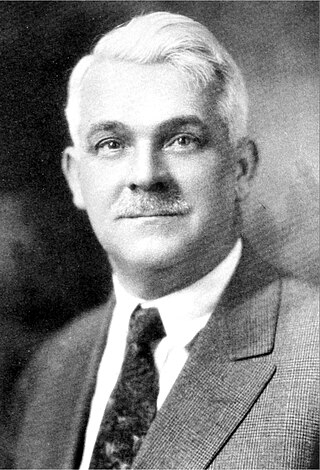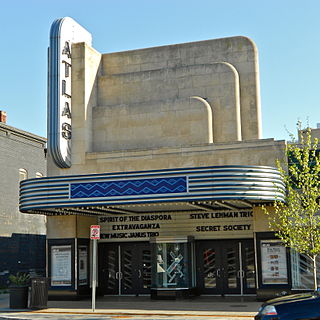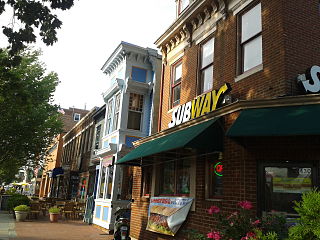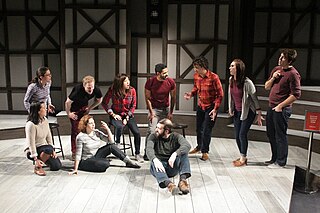
The National Council of the Churches of Christ in the USA, usually identified as the National Council of Churches (NCC), is the largest ecumenical body in the United States. NCC is an ecumenical partnership of 38 Christian faith groups in the United States. Its member communions include mainline Protestant, Eastern Orthodox, Oriental Orthodox, African-American, evangelical, and historic peace churches. Together, it encompasses more than 100,000 local congregations and 40 million adherents. It began as the Federal Council of Churches in 1908, and expanded through merger with several other ecumenical organizations to become the National Council of Churches in 1950. Its Interim President and General Secretary is Bishop Vashti Murphy McKenzie.

Ford's Theatre is a theater located in Washington, D.C., which opened in 1863. The theater is best known for being the site of the assassination of Abraham Lincoln. On the night of April 14, 1865, John Wilkes Booth entered the theater box where Lincoln was watching a performance of Tom Taylor's play Our American Cousin, slipped the single-shot, 5.87-inch derringer from his pocket and fired at Lincoln's head. After being shot, the fatally wounded Lincoln was carried across the street to the nearby Petersen House, where he died the next morning.

Capitol Hill is a neighborhood in Washington, D.C., located in both Northeast D.C. and Southeast D.C.. Bounded by 14th Street SE & NE, F Street NE, Southeast Boulevard SE, South Capitol Street SE. Dominated by the United States Capitol, which sits on the highest point of Capitol Hill, it is one of the oldest historic districts in Washington. Home to around 35,000 people in just under 2 square miles (5 km2), Capitol Hill is also one of the most densely populated neighborhoods in Washington, D.C.. The name "Capitol Hill" is frequently used as a metonym for the U.S. Congress.

Capitol Hill is a densely populated residential district and a neighborhood in Seattle, Washington, United States. It is immediately east of Downtown Seattle and north of First Hill. The neighborhood is one of the city's most popular nightlife and entertainment districts and is home to a historic gay village and vibrant counterculture community.

The Eastern Market is a public market in the Capitol Hill neighborhood of Washington, D.C., housed in a 19th-century brick building. Eastern Market was listed on the National Register of Historic Places in 1971. It is located on 7th Street, S.E., a few blocks east of the U.S. Capitol between North Carolina Avenue SE and C Street SE. Badly damaged by an early-morning fire in 2007, the market building reopened in the summer of 2009 following an extensive renovation.

Shaw is a neighborhood of Washington, D.C., located in the Northwest quadrant. Shaw is a major entertainment and retail hub, and much of the neighborhood is designated as a historic district, including the smaller Blagden Alley-Naylor Court Historic District. Shaw and the U Street Corridor have historically have been the city's hub for African-American social, cultural, and economic life.
WAMU is a public news–talk station that services the greater Washington, DC metropolitan area. It is owned by American University, and its studios are located near the campus in northwest Washington. WAMU has been the primary National Public Radio member station for Washington since 2007.

Thomas White Lamb was a Scottish-born, American architect. He was one of the foremost designers of theaters and cinemas of the 20th century.
Landmark Theatres is a movie theatre chain founded in 1974 in the United States. It was formerly dedicated to exhibiting and marketing independent and foreign films. Landmark consists of 34 theatres with 176 screens in 24 markets. It is known for both its historic and newer, more modern theatres. Helmed by its President, Kevin Holloway, Landmark Theatres is part of Cohen Media Group.
A cafe church is a Christian church centered in cafés. These edifices are associated with alternative worship and the emerging church movements, and seek to find new forms and approaches to existing as a church in the 21st century. These churches are often focused on relationship aspects of Christian fellowship and outreach to their local community, and use the modern gathering place of a café in their ministry.

Lincoln Theatre is a historic theater in Washington, D.C., located at 1215 U Street, next to Ben's Chili Bowl. The theater, located on "Washington's Black Broadway", served the city's African American community when segregation kept them out of other venues. The Lincoln Theatre included a movie house and ballroom, and hosted jazz and big band performers such as Duke Ellington. The theater closed after the 1968 race-related riots. It was restored and reopened in 1994, and hosts a variety of performances and events. The U Street Metro station, which opened in 1991, is located across the street from the Lincoln Theatre.

The Howard Theatre is a historic theater, located at 620 T Street, Northwest, Washington, D.C., has been a pillar of the community since its opening in 1910. This historic venue, added to the National Register of Historic Places in 1974, showcases a variety of events, including live music, comedy, weddings, private events, and more.

The culture of Washington, D.C. is reflected in its status as the capital of the United States and the presence of the federal government, its large Black population, and its role as the largest city in the Chesapeake Bay region. The presence of the U.S. federal government, in particular, has been instrumental in developing numerous cultural institutions throughout the city, such as museums and performing arts centers. The city's historic Black population has also helped drive cultural activities and artistic pursuits. During the early 20th century, for example, Washington's U Street Corridor became an important center for African American culture.

Christ Church — known also as Christ Church, Washington Parish or Christ Church on Capitol Hill — is a historic Episcopal church located at 620 G Street SE in Washington, D.C., USA. The church is also called Christ Church, Navy Yard, because of its proximity to the Washington Navy Yard and the nearby U.S. Marine Barracks.
Mark Batterson is an American pastor and author. Batterson serves as lead pastor of National Community Church in Washington, D.C. NCC was recognized as one of the Most Innovative and Most Influential Churches in America by Outreach Magazine in 2008. Batterson is also the author of the books Win the Day,In a Pit with a Lion on a Snowy Day, and Wild Goose Chase. Batterson's New York Times bestseller The Circle Maker: Praying Circles Around Your Biggest Dreams and Greatest Fears was released in December 2011.

The Atlas Performing Arts Center is a multiple space performing arts facility located on H Street in the Near Northeast neighborhood of Washington, DC. Housed in a renovated Art Deco movie house, the facility is home to several arts organizations.
Robert Leonard Schenck is an American Evangelical clergyman who has ministered to elected and appointed officials in Washington, D.C. and serves as president of a non-profit organization named for Dietrich Bonhoeffer. Schenck founded the organization Faith and Action in 1995 and led it until 2018. He is the subject of the Emmy Award-winning 2016 Abigail Disney documentary, The Armor of Light. Schenck stated that he was part of a group that paid Norma McCorvey to lie that she had changed her mind and turned against abortion. Once a prominent anti-abortion activist, Schenck has since repudiated this work and expressed support for the legality of abortion. In 2022, Schenck testified before the House Judiciary Committee concerning his allegation that a member of the Supreme Court leaked information about a pending case before the Court.

Barracks Row is a commercial strip along 8th Street SE that connects the Navy Yard and Capitol Hill neighborhoods in the Southeast of Washington, D.C., south of Eastern Market, between M Street SE and Pennsylvania Avenue SE. The area takes its name from the Marine Barracks, also known as 8th & I, which it faces along 8th Street SE.

Washington Improv Theater (WIT) is an improvisational comedy theater company in Washington, D.C., specializing in long-form improv. It was founded in 1986 by Carole Douglis. Its shows are based at Studio Theatre on the 14th Street corridor, although its teams also use several other venues. Roughly 20,000 people attend WIT shows annually.















